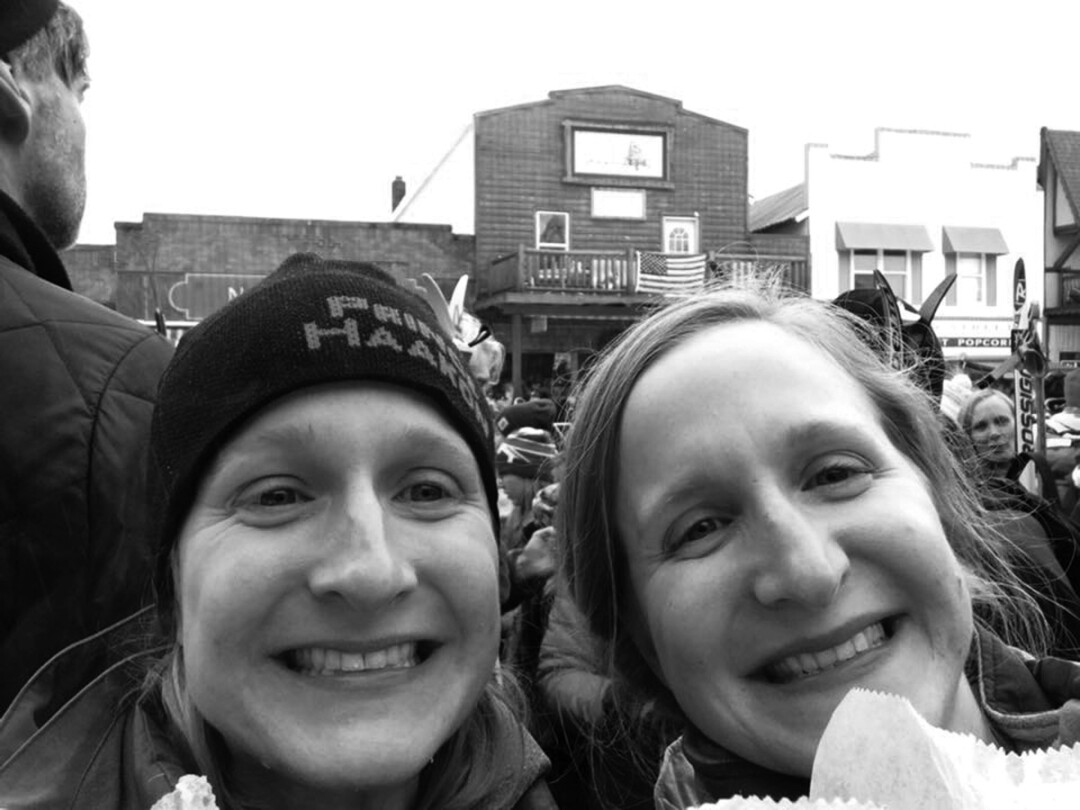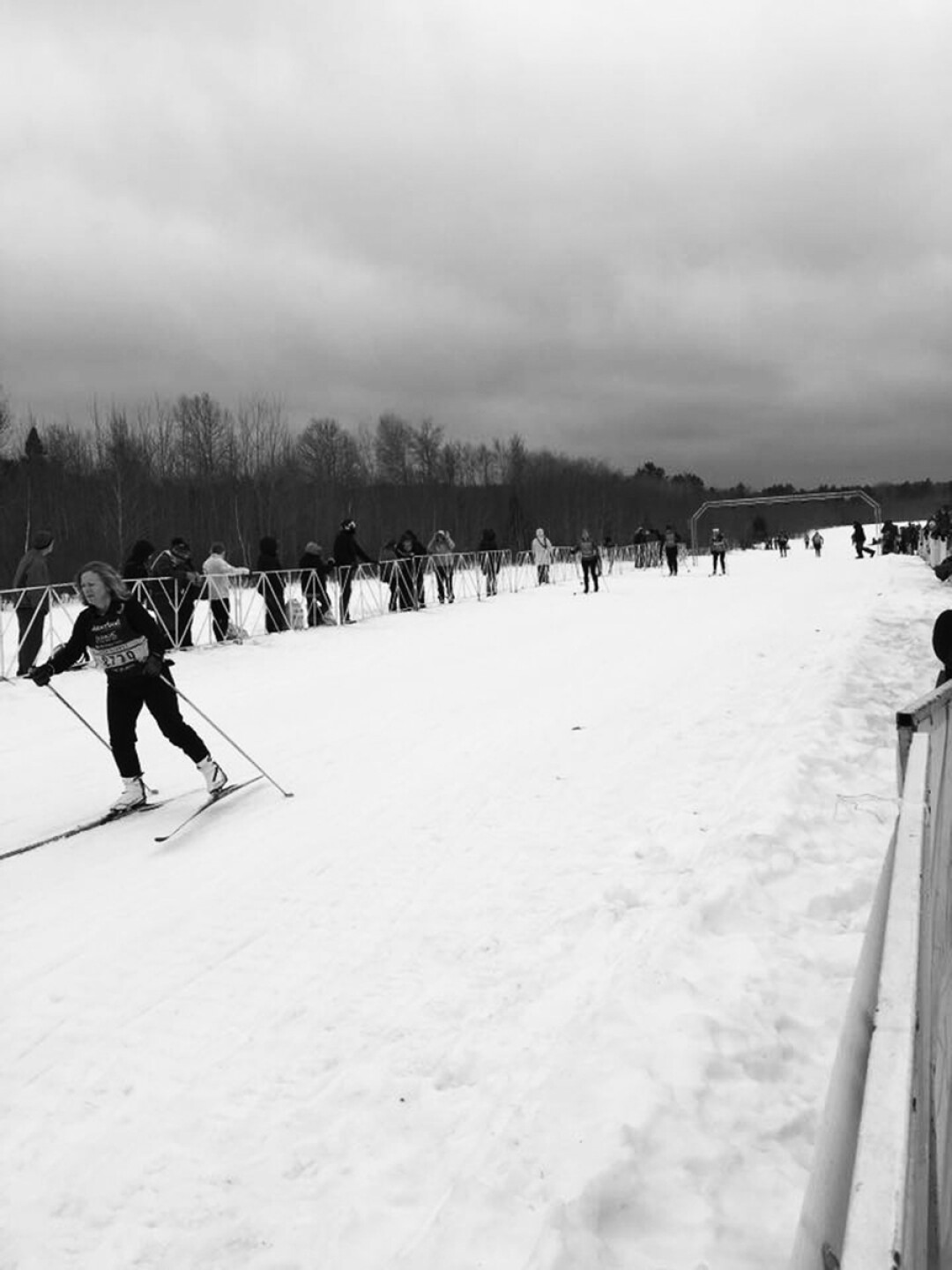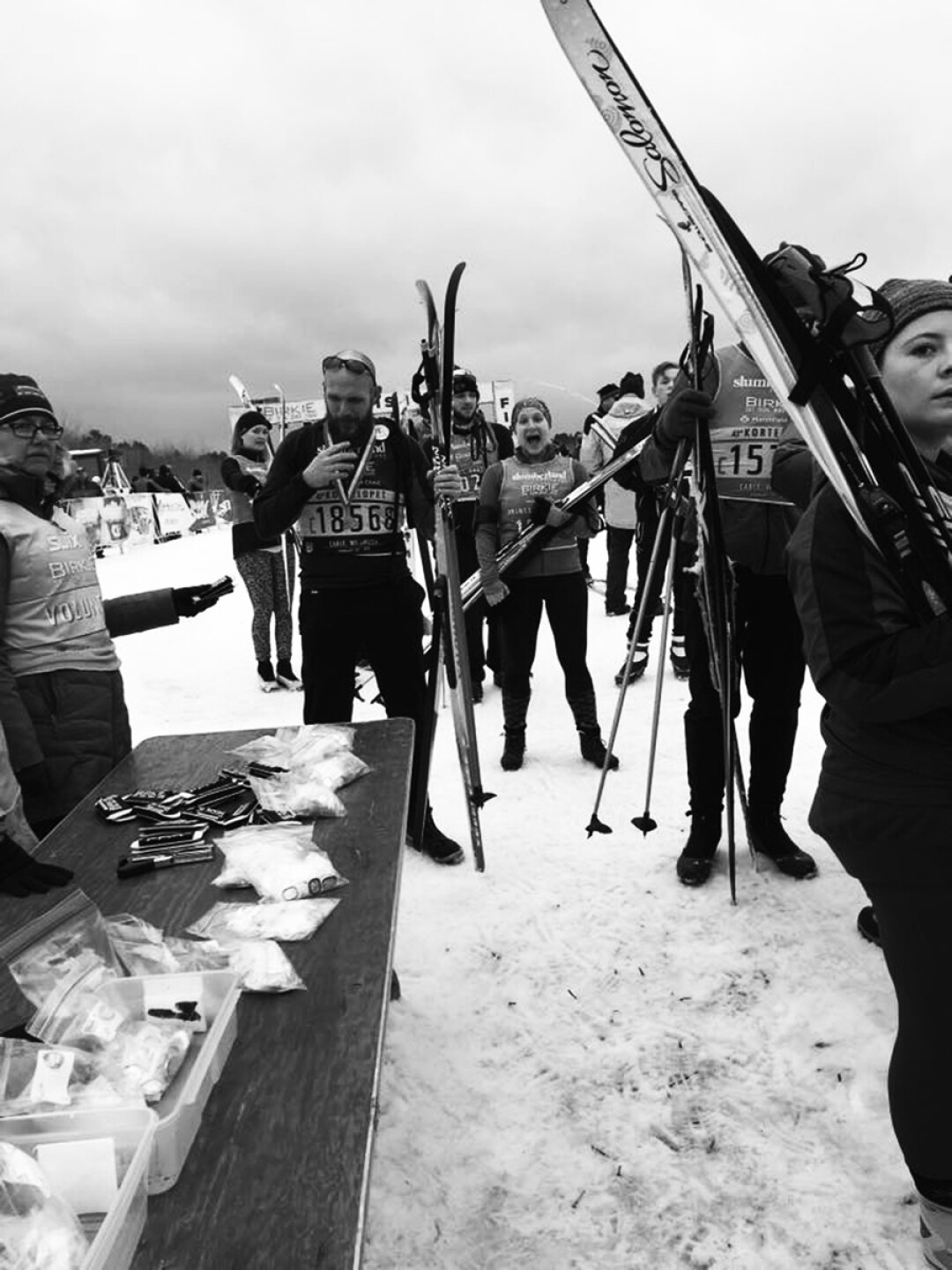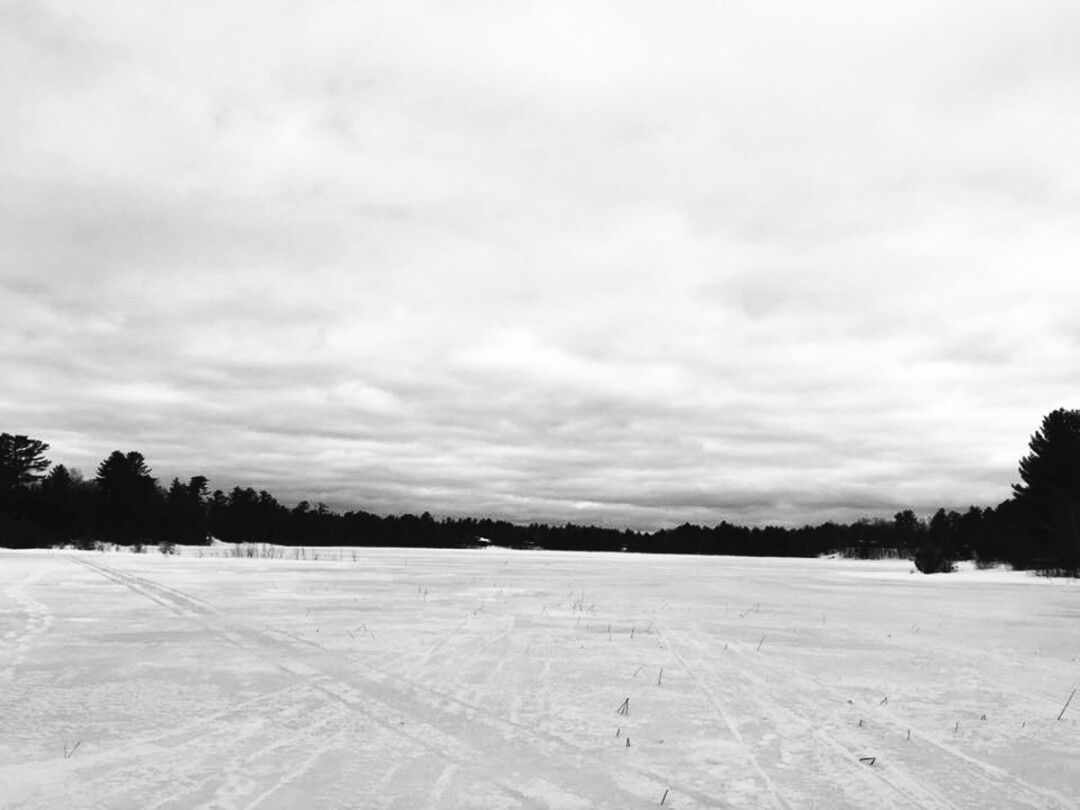FEATURE: Sisters on Separate Trails
as her twin sister – a first-time skier – tackles the American Birkebeiner, writer Katie Venit ponders the very different paths their lives have taken

Breathless from half-jogging, half-skating from the parking lot, I squeezed between two people ringing cowbells to peer over a rope line. Skiers rounded a bend a few hundred yards away, leaving thick woods behind as the trail straightened into the finish gates. The announcer congratulated each skier by name, booming over cheers and cowbells. I scanned the skiers as they approached, hoping I hadn’t missed her. I glanced at my phone: a half hour late. No cell reception. She had probably already finished and was searching for me.
She was upright and skiing faster than I could have, but her frame matched mine. Plus, as her twin sister, I just knew. It was her.
“Dammit,” I thought. My one weekend away, my day without kids, my one chance to see her cross the finish line, and I had already screwed it up. I was about to leave the line to look for her, when, finally, out of the woods, I saw a skier. I held my breath and squinted: she was a head (or more) shorter than the others, slim, and decked out in new ski gear. She was upright and skiing faster than I could have, but her frame matched mine. Plus, as her twin sister, I just knew. It was her.
“BETH!” I waved furiously. “BETHIE!” She caught my eye, beaming as the announcer welcomed her “all the way from Washington, D.C.” and congratulated her on completing her first Prince Haakon race.
Beth, still smiling, was hugging her skis and poles when I found her on the other side of the finish line. She was in good shape for having just skied 12 kilometers, which brought her total lifetime ski mileage up to 12 kilometers. We clung to each other, letting traffic part around us.
She overflowed with exclamation marks. “That was so awesome! I had so much fun! Everyone here is so nice! I met two girls from Minnesota at the starting line! When I slid down a hill face first, they said, ‘Get off your face, D.C.!’ They gave me a nickname!” Nicknames play an important role in Beth’s life. Back East, she belongs to an urban night running and drinking club. Everyone wants a nickname. That’s how you know you’ve been accepted. Due to her being both a veterinarian and quite petite, they call her Dr. Toolittle.
Beth toted her poles and skis to the parking lot, waving away my offers to carry them, claiming her arms weren’t tired. My own arms ached with lightness, uncomfortable with being empty while others carried. They swung oddly as we trudged, fluid and loose in their sockets. I felt like I should be carrying a baby, a bag ... something. At the car, we settled in for the long drive through deep pines to the next rendezvous.

• • •
Despite (or because of) our identical faces, my sister and I cultivated different lives growing up in Maryland, and when we went to college, it was to opposite ends of the East Coast. Beth launched into rugby, playing against women who all had at least 60 pounds and 5 inches on her. She liked running, singing dirty songs, and drinking warm beer from sweaty cleats. The running continued even when beery cleats stopped. I went to a smaller college that felt more like a home than an adventure. I did nothing that would earn me a nickname ... well, almost nothing. Once during college I had had one too many after a single Bud Light. My friends called me Uno.
Beth is the adventurous twin, and for a while one of her favorite hobbies was trying to talk me into vacations unsuitable for my fitness level. Example: the Grand Canyon. Research turned up some nuggets that persuaded me to stay home, such as “six types of rattlesnakes live in the canyon” and “flash floods are probable.” Also, there was the part about hiking a mile-and-a-half straight down and back up the canyon walls in triple-digit weather, and, oh yes, one path did not have access to water. Besides, I had a newly minted fetus, and I didn’t fancy puking into one of America’s most treasured landmarks.
At UW-Eau Claire, there is a 100-foot-tall staircase winding up a wooded hill. That staircase has guided decades of undergraduates between upper and lower campus and convinced many high school seniors to matriculate elsewhere. Aggressive winter salting has worn the steps’ front edges to a buttery smooth bevel; the softer wood in their middles shows whorls and knotholes. Halfway up is a hut that grows moss on its shingles and drips water from its eaves. When I first started working at the university, I would collapse on a bench in that hut, trying to catch my breath. I thought I had gotten pretty good since then, but the other day a woman with an Aircast on her foot and hot coffee in a teacup passed me and summitted before I got halfway. Another time a deer beat me up the hillside despite thick underbrush. Also, it only had three legs.
And Beth wanted me to hike the Grand Canyon.
The year after the Grand Canyon, she championed a trip that would take “us” hiking for four days along the mountainous Inca Trail to Machu Picchu. The Peruvian government requires hikers to hire a sherpa, and I have a strict policy against vacations requiring a sherpa. Still, Beth asked me to look into it. The Inca Trail winds through jungles and cloud forests to a 2-mile-high mountain pass called Warmiwanusqa, which translates to – and this may be where she lost my interest – “Dead Woman’s Pass.”
Apparently, there is a bus that will leave from a spa and drive tourists up the mountain to Machu Picchu. I suggested that instead of hiking, she simply spend that time at the spa and then bus up, but apparently the fun part was the four-day-long sherpa hike.
Truthfully, despite my anti-sherpa policy, I was tempted. I ache to be around her.

• • •
Beth hadn’t trained for any of those adventures; she simply charmed people into going (usually my younger brother, who is a sucker) and bought a plane ticket. In that sense, deciding to participate in a massive ski race in the Wisconsin northwoods despite never having skied before is totally in her wheelhouse. I credit this particular adventure to Beth’s boyfriend, Justin. They met in their urban night running and drinking club. He does fun things like warming up for an ultramarathon with a 10-mile jog.
He had been trying to convince her to take up skiing and figured the best way would be for her to jump in with both feet. Skis. Whatever. Beth’s race, the Prince Haakon, is the shortest of three races in the American Birkebeiner. The longest race, the Birkebeiner itself, is 54 long, hilly kilometers. In 2016, when this story takes place, the Prince Haakon covered the beginning of the same course but looped the skiers back to the starting line in Cable while the Birkie skiers went south to Hayward.
With Beth’s skis awkwardly crammed in with my kids’ car seats, we headed from Cable to Hayward, and to Justin. As we drove, a rare February sprinkle began, and Beth’s endorphin-fueled stream of consciousness jumped between gushing over her race and worrying for her friend, Steve, who decided to tackle the full Birkie even though he was also a ski virgin. The rain wasn’t helping. She checked the Birkie app; Steve was still moving, but at a rate that would get him pulled off the course soon. She snapped on Birkie Radio – two cheerful “up north” hosts asked finishers to introduce themselves and encouraged them to “enjoy themselves at the hospitality tent,” because they “earned it.”
Bethie squealed. “Their accents are so awesome!”
“Honestly, it’s not that noticeable to me anymore.”
“I love it. It’s like Fargo.”
I started to explain that the northern Wisconsin accent is quite distinct from the others in the Upper Midwest but was distracted when I realized she hadn’t noticed my own speech had become an uncommitted hybrid, unsure whether I belonged in Wisconsin or Maryland. Here, people tease me for how I pronounce “tag.” There, people tease me for how I pronounce “Uff da.”
After parking, we maneuvered our way through downtown Hayward, a tourist’s dream of a proper frontier town, with high wooden building facades, covered wooden walkways, and wide streets. Where lumberjacks used to rumble by on wagons piled high, skiers now poled to the finish. A temporary snow-covered bridge stretched over the highway, allowing skiers and pedestrians to cross unimpeded by traffic lights. Thousands of people lined the home stretch, armed with beer, brats, and bells.
At the edge of the crowd stood the hospitality tent, a circus-sized behemoth ringed with local beer vendors, their drafts displayed on chalkboards. Straw covered the ice underfoot, but cold seeped up through our boots regardless. If not unique to Wisconsin, the smell of hops, ice, and straw was at least characteristic of it. Surprisingly, I found the combination as reassuring as the tulip poplar blossoms and burst walnuts that perfume the woods of my Maryland childhood. Justin was already well past his first beer. He listened attentively as Bethie rehashed her first race, clearly happy she had enjoyed herself. He introduced me to his college friends, whom he meets up with every year. Some of them had skied that morning, but many, like me, just came to watch.
“You twins?” one of them asked. “Which is the good twin and which is the evil twin?” We smiled obligingly at the tired joke. As usual, Beth replied that she’s the evil twin, but for the first time she added, “Katie is all the best parts of me concentrated and amplified into an entire person.”
“You twins?” one of them asked. “Which is the good twin and which is the evil twin?”
We smiled obligingly at the tired joke. As usual, Beth replied that she’s the evil twin, but for the first time she added, “Katie is all the best parts of me concentrated and amplified into an entire person.”
As we drank Lucette Slow Hand, Beth described the Prince Haakon route and tried to convince other moral supporters to sign up next year. She told her stories and jokes (“Get off your face, D.C.!”). I made small talk, mostly about my kids. Third generation Scandinavians chatted in the noisy tent, while snippets of the Birkie legend sifted through the din. Steve finally arrived, having been pulled off the course, his pride dented but not broken, his good humor intact. Everyone, even those who failed, glowed in their accomplishment. I started to see the appeal. But it seemed so scary; was there a safety net? “Justin,” I asked, “if you’re struggling on the Prince Haakon, do they pick you up? You know, like they did for Steve on the Birkie?”
“Oh no. A race like the Prince Haakon, they just expect you to finish.” I’m sure to him it was a silly question. He’d skied 50 kilometers before lunch and probably still itched for a jog.

• • •
As beers were erased from the chalkboards and barrels packed away, I watched my face and the woman wearing it tell charming jokes and regale people with stories from her ski. She told them they should try it next year. Obviously, nothing in my genes prevented me from doing it, and yet I feared my body would have buckled had I woken up, learned how to ski, and then actually skied for 12 slushy, icy kilometers. Had my life taken a different direction, my abilities might have more closely resembled hers. Would I be happier living in her body rather than mine? Would I be less anxious? Would I sleep better? Would I enjoy chatting with strangers and taking frequent weekend trips, or would I yearn for the weight of a familiar baby fitting into my hip like a puzzle piece? The thought of life without my children is terrifying, repulsive, but at times a welcome fantasy.
Sometimes I ask Beth about her weekend to get a taste of my alternate life. “How late did you stay up?” I demand, like a recovering addict leaning into someone else’s secondhand. “Did you sleep in? Did you have fun?” She has adult conversations with interesting people and cooks sophisticated meals, I am sure. She doesn’t even keep peanut butter in the house.
Sometimes I ask Beth about her weekend to get a taste of my alternate life. “How late did you stay up?” I demand, like a recovering addict leaning into someone else’s secondhand. “Did you sleep in? Did you have fun?” She has adult conversations with interesting people and cooks sophisticated meals, I am sure. She doesn’t even keep peanut butter in the house.
We headed back through the deep pines to a cabin, listening to Birkie Radio. The finishers now sounded much less excited to be talking to someone holding a microphone. The hosts no longer pushed them towards the hospitality tent; the beer was all gone anyway.
Butting up against a frozen lake, our cabin was stuffed with gear, sleeping bags, and people. A fire bubbled in the hearth while taco meat simmered. More visitors trickled in throughout the evening. I stopped introducing myself and trusted my face to handle formalities. Beth resumed her efforts to convince those who had come as bystanders to try the Prince Haakon next year, assuring them they could finish. She seemed so certain, so enthusiastic. At some point I realized that I was the only person who she hadn’t talked to about it.
“How come you haven’t tried to convince me to do it?” I finally asked her.
She waved her hand. “Oh, it’s not really your thing.”
That stung.
I needed some air. Justin assured me (many times) that the ice was thick enough, despite the warm day. I strapped on my snowshoes, then picked down the hillside, through the trees that pillowed the cabin in stillness, over the deep snow down to the water’s edge. As I pushed through the darkening woods, the lake opened out. The setting sun tinted the clouds orange and red and pink, the houses pink, the ice pink, inviting me out from the gloom. There was little change between walking on ground and walking on the ice, except for an intangible barrier between ground and water, safety and fear. Despite living in Wisconsin for a decade, I have remained a southerner who is deeply mistrustful of walking on water. Trembling, I tested the ice with one pole and then the other before finally stepping out. I held my breath in case of sudden immersion; the ice also held. So I walked.
There was silence broken only by the symmetrical crunch crunch of my cleats and poles and by the occasional cowbell. Snowmobile tracks crossed over deer tracks, which I in turn crossed over, our paths coming together, intertwining, moving apart as we navigated around hidden peninsulas, sudden sprays of brush and saplings erupting from ice.
Walking on that lake, my fear slowly retreated to a mild vibration. Strength eased into its place, a strength honed through years of carrying more than my own weight through the world. Rather than a reckless strength that craved new challenges, it drew from familiarity. I felt the muscles in my arms and back, tough from carrying toddlers, knowing just how much force was needed to lift each one. My quads ran tight beneath my skin, moving me surely across the ice. I felt the confidence of endurance, gained through uncomfortable pregnancies, through continuing on past depleted reserves after years with little sleep.
I wouldn’t hike the Inca Trail, but here, at least, I could be the sherpa who knows the way through the mountain pass.



















